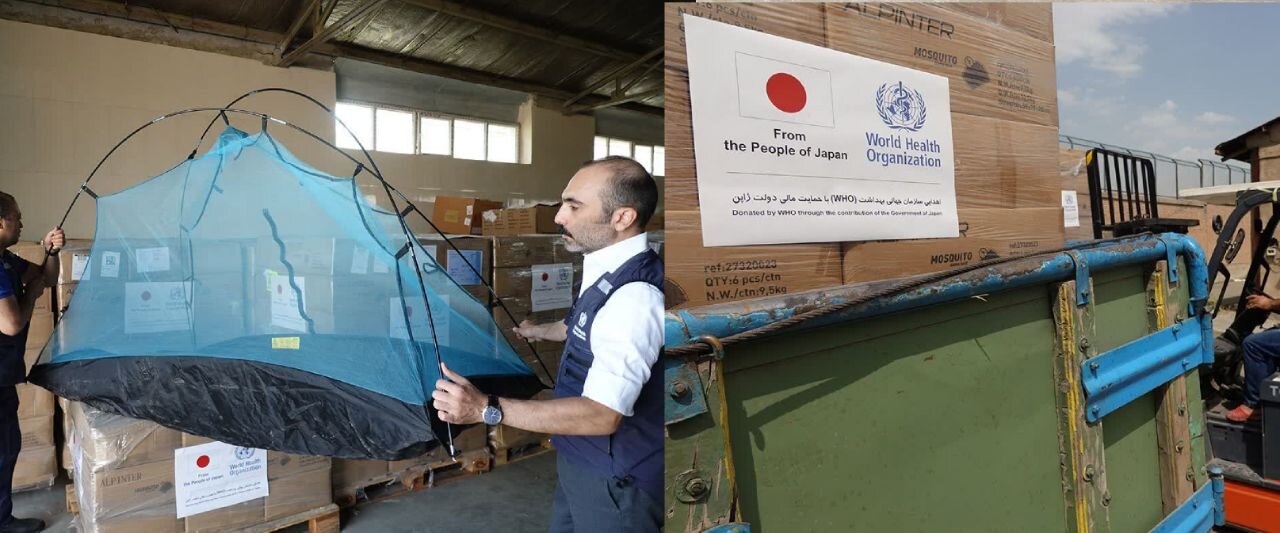WHO Japan further support Iran in eradicating malaria
WHO, Japan further support Iran in eradicating malaria
TEHRAN -In an effort to enhance the capacity of the health ministry to address the prevalence of malaria in southeastern regions, the World Health Organization (WHO) in cooperation with the Government of Japan has procured 50,000 malaria rapid diagnostic tests as well as 4,902 mosquito dome tents.

Due to frequent movement between Afghanistan, Pakistan, and Iran, the country's southeastern regions are at risk of malaria.
The tests, which provide clear evidence of the presence of malaria parasites in human blood allowing for timely and appropriate treatment, are an essential tool in the fight against malaria, the WHO website announced in a press release on October 24.
The Ministry of Health and Medical Education’s Center for Communicable Disease Control is currently distributing the tests to health centers and hospitals in Sistan-Baluchestan Province through 3 universities of medical sciences, namely Zahedan, Iranshahr and Chabahar – in the Province.
Also, the mosquito dome tents, are designed to provide a mosquito-free resting environment for individuals at risk, particularly vehicle drivers who frequently travel between the 3 countries, border guards, and health care workers stationed in high-risk areas.
The mosquito tents have been distributed to the same 3 universities of medical sciences in the province.
The universities will oversee the final distribution of tents within the province.
“By offering protection against mosquito bites, these tents help reduce the risk of malaria transmission. The initiative is a testament to the collaborative efforts of international partners in addressing public health challenges and supporting vulnerable communities,” said WHO Representative and Head of Mission in the Islamic Republic of Iran Syed Jaffar Hussain.
Hussain highlighted the broader impact of the donations: “The impact of these donations, made with the support of the Government of Japan, extends beyond immediate malaria prevention and diagnosis. By strengthening the capacity of local healthcare systems, these efforts contribute to the long-term goal of malaria elimination in the Region. The availability of rapid diagnostic tests ensures that suspected cases of malaria can be confirmed quickly, reducing the risk of severe illness and death, while the use of mosquito tents provides a practical and effective means of protection for those most at risk, helping to break the cycle of transmission.”
“This project is a response to the increase in the number of malaria cases in Sistan-Baluchestan Province which is largely due to the floods that occurred in Pakistan in 2022.
The project aims to strengthen Iran's capacity to respond to the threat of malaria and prevent the spread of the disease,” said the Ambassador of Japan to Iran, Tamaki Tsukada.
Further bolstering the fight against malaria, WHO procured insecticides, including deltamethrin, bendiocarb, and Fludora Fusion, which are critical to vector control strategies. The use of insecticides will complement other malaria control measures such as the distribution of mosquito nets and implementation of indoor residual spraying programmes.
The comprehensive support provided by WHO and the Government of Japan enhances the capacity to combat malaria, protect public health and contribute to the overall well-being and resilience of affected populations.
This collaboration between international partners and local authorities underscores the importance of solidarity and shared responsibility in addressing global health challenges.
As the fight against malaria continues, the continued commitment of all involved parties is crucial.
WHO’s ongoing support, combined with the efforts of the Ministry of Health and Medical Education and local health care providers, will make a significant difference in the lives of those at risk, and pave the way for a malaria-free future in southeast Iran, bringing relief to countless individuals and families.
In March, the WHO launched a new project with the financial support of the Government of Japan to revive malaria prevention and control in south-eastern provinces of Iran, which host vulnerable populations, including Afghan refugees.
Iran was well on track to eliminate malaria. Recently, however, climate change-related floods have affected the country, expanding its mosquito habitat and driving malaria transmission.
The project, entitled Reinforcing Malaria Elimination as Humanitarian Assistance in the Islamic Republic of Iran, will run throughout 2024. WHO is implementing the project with the Iranian Ministry of Health and Medical Education, WHO website reported on March 20.
Hussain stressed the vital importance of collaborative action with the Government of Japan, “The financial support provided by the people of Japan arrives at a critical juncture, following recent heavy rains and floods in Sistan-Baluchestan province in late February 2024. Through concerted efforts and sustained investment, WHO and its international and local partners remain steadfast in their commitment to combat malaria and safeguard public health in the Islamic Republic of Iran and beyond.”
Tsukada, for his part, said, “The effect of climate change has led to frequent flooding in many parts of the world, including Iran.
Malaria, one of the world’s 3 major infectious diseases, spreads through mosquitoes after floods. In order to protect the Iranian people from malaria, it is important to exterminate mosquitoes, protect oneself from mosquitoes, and quickly diagnose and treat malaria cases at an early stage. We hope that this project will strengthen Iran’s crisis response capacity and prevent the spread of malaria and other infectious diseases.”
The country is prone to natural disasters, especially floods, and the Iranian health system remains vulnerable. More than one-third of the country’s 877 urban health centers are in flood-prone areas
WHO will help improve risk communication and community engagement to reach target populations with appropriate health messages on how to protect against malaria.
MT/MG
source: tehrantimes.com